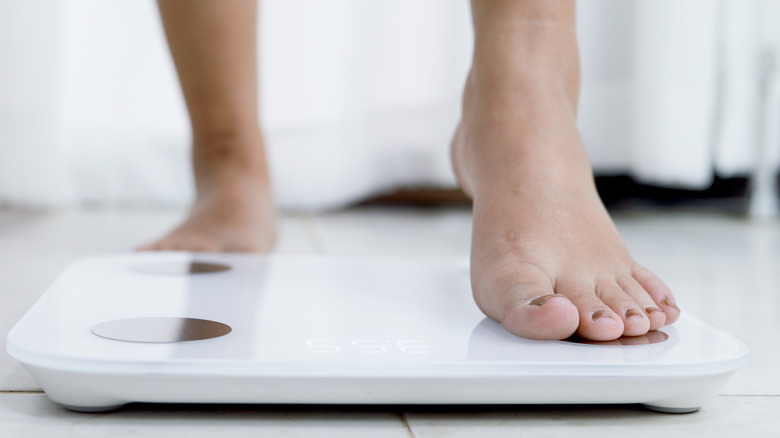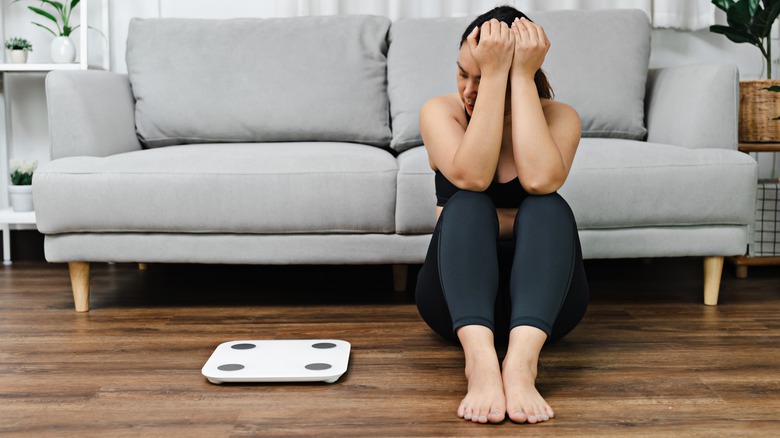Why Some Doctors Warn Against The Five-Bite Diet - Exclusive
We've all been there: You want a quick fix to lose weight before a special event. But, despite what fans of crash diets claim, the dangers of restricting your food intake far outweigh the convenience of dropping pounds fast.
"All efforts to restrict intentionally are harmful," Dr. Stacey Rosenfeld, founder of Gatewell Therapy Center, explained to The List. "Fad diets can be especially detrimental, as they're often more restricted and more highly marketed [than healthy eating]."
Plus, as Dr. Rosenfeld points out, fad diets not only leave you psychologically and physically deprived, but "they're bound to fail, potentially leaving lasting eating issues in their wake."
The five-bite diet, for instance, is one of the more dangerous fad diets that has gone viral. Created in 2007 by Dr. Alwin Lewis, it's supposed to be an alternative to gastric bypass surgery, per Healthline. According to Dr. Lewis, eating as if you've had weight loss surgery will naturally shrink your stomach and make you lose weight.
The diet promises you can eat anything you want — but you're only allowed five bites of it per meal. Dr. Lewis even encourages skipping breakfast and limiting yourself to 10 to 12 bites of food a day. But liquid intake is unlimited as long as it's calorie-free (via Healthline).
Although the five-bite diet seems easy to follow, many experts believe that the regimen is both ineffective and dangerous to your health.
The five-bite diet could ruin your metabolism
Crash diets, like the five-bite diet, only give you temporary results, Dr. Julianne Barry, a general practitioner at London Doctors Clinic, told Cosmopolitan UK. One of the major reasons this diet doesn't work is because a healthy metabolism is a major factor in weight management, and crash diets actually slow down your metabolism.
"Muscle breakdown is much greater with extreme dieting," Dr. Barry explains. "Less muscle reduces your metabolic rate, which is the number of calories you burn while resting." So, on top of not burning as many calories when you're at rest, your metabolism won't speed up once you start eating normally again, either.
Carly Fraser, owner and founder of the health website Live Love Fruit, wrote on her blog that she had unknowingly restricted too much when she started a new diet and is still struggling with getting her metabolism back to normal.
The problem, Fraser explains, is that diets like the five-bite diet put your body into starvation mode, which can lower your metabolism, affect your ability to regulate temperature, and potentially damage your organs, per NPR.
But these aren't the only reasons you need to steer clear of the five-bite diet.
It will make you lose and gain water weight rapidly
One of the things experts want you to understand about crash diets like the five-bite diet is that much of the weight you lose is just water weight.
While not feeling bloated is a nice side effect, Dr. Julianne Barry explained to Cosmopolitan UK that, when you lose water, you lose glycogen stores, too. That means you're risking dehydration, which can lead to headaches and feeling dizzy, and, when you do start eating normal again, the first thing your body will do is restore your glycogen. In other words, that water weight will come right back.
It's important to understand that water weight isn't a bad thing. "Water weight gain is our body's way of protecting itself against dehydration because our body can only survive for a couple of days without water," said Erica Zellner, MS, LDN, a health coach with Parsley Health, per Women's Health.
When you're dehydrated, your body holds onto more water, Zellner explained, so, if you yo-yo between hydrating and dehydrating, your body is going to retain more water to ensure its survival.
To stay properly hydrated, Zellner recommends "drinking about half of your body weight in ounces of water a day" and avoiding eating salty and processed foods.
Vitamin deficiency is a major danger of the five-bite diet
The five-bite diet — like other restrictive diets, cleanses, and fasts — severely limits the amount of nutrition you're getting, even if you're taking multivitamins. Studies show that, while vitamins can be beneficial, they're not enough to replace the benefits of eating healthily.
According to Dr. Julianne Barry of London Doctors Clinic, a vitamin deficiency can leave you feeling exhausted; damage your hair or make it fall out; dry out your skin, leading to acne; and weaken your immune system (via Cosmopolitan UK). Even just cutting out fatty foods severely limits your potential absorption of vitamins A, D, E, and K, says Dr. Barry, which are vital for a strong immune system.
When you severely limit food intake, you're also likely limiting your absorption of important minerals like potassium, magnesium, copper, and sodium, which can lead to dehydration, heart arrhythmias, palpitations, and even fainting, according to Health.com (via CNN).
While the goal of the five-bite diet is to look your best by shedding pounds, it may actually make you look and feel your worst — while potentially leaving lasting damage in its wake.
Experts say this diet is as dangerous as an eating disorder
Eating disorder development is another major risk associated with the five-bite diet. When The List asked Serena Nangia of Project Heal, which helps people with eating disorders recover, she said that the diet definitely has the potential to be dangerous. "[I]t is seen as just a way to lose weight rather than a serious illness," she said.
She added that, besides developing an eating disorder, a five-bite dieter risks damaging their heart, teeth, reproductive system, and skeletal system. If you lose weight too quickly — more than three pounds per week — you run the risk of losing bone and muscle, otherwise known as lean body mass, instead of fat, explains Obesity Action Coalition.
While studies show that burning more calories than you eat in a day will lead to weight loss, the dangers of very-low-calorie diets have been well documented.
A 1981 study published in The American Journal of Clinical Nutrition found that 17 people died suddenly and concurrently due to their diets. Each patient was obese when they began medically supervised weight loss and died of ventricular arrhythmia around five months into their diets. When their hearts were examined after death, there were clear signs of starvation, according to the study.
Even under controlled conditions, long-term use of the five-bite diet is extremely risky, and you may end up losing more than you bargained for.




